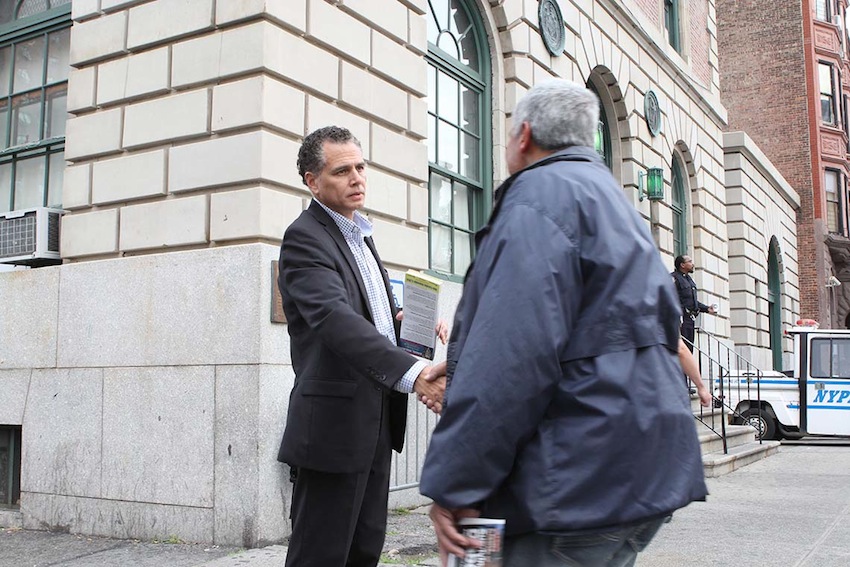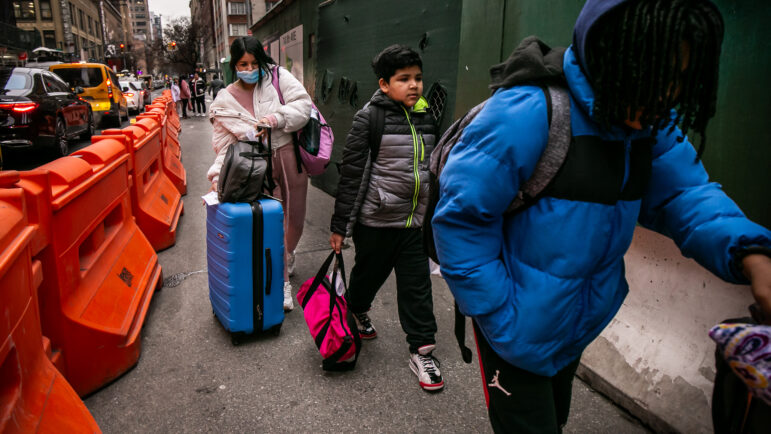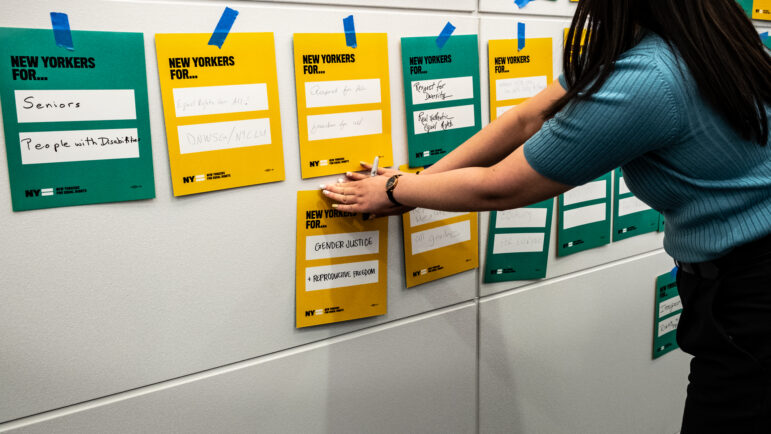
Cole Rosengren
Angel Molina, long-shot candidate to unseat Assemblywoman Carmen Arroyo.
Many people in Angel Molina’s position would have quit by now. Instead, he’s woken up early yet again to put on his black suit, stand outside a subway station and try to change the South Bronx.
Few of Molina’s Mott Haven neighbors take campaign cards on this gray morning, but he still greets them in English and Spanish with a smile every time.
Assemblywoman Carmen Arroyo has represented the 84th District since 1994 and Molina is on a long-shot mission to defeat her in next week’s election.
Molina—a registered Democrat—is running as a Republican, but you won’t see that anywhere on his campaign literature. Instead, residents are asked to “Vote Row ‘B.’” In a district where Democrats outnumber Republicans 20-to-1, Molina has decided not to advertise his new affiliation. Arroyo’s legal team shut Molina out of the primary election, but he found a new party line to run on and isn’t giving up yet.
“The Bronx used to be a place that was sort of the forgotten borough and anybody did what the hell they wanted to do there. Nobody paid attention, nobody cared. But this is a very different place now,” Molina says.
Arroyo’s time in office has been tumultuous, and Molina has big ideas for revitalizing the South Bronx, but so far he hasn’t gained much traction. Especially in New York, it’s nearly impossible to defeat an incumbent without enough money.
Molina learned this the hard way twice in the past year and a half. Last year, he tried to run against Speaker Melissa Mark-Viverito for the Democratic nomination in her City Council district. Ricardo Cosme—Arroyo’s chief of staff at the time—successfully filed a petition challenging Molina’s signatures and knocked him off the ballot. This year in August, Stanley Schlein, a well-known operative for the Bronx Democratic party apparatus, challenged Molina’s signatures to get on the Democratic primary ballot for state assembly. Because Molina couldn’t afford a legal battle, he withdrew his petition.
“Look, I pose a viable threat to them and they know that and they’re gonna do whatever they can,” Molina says. In a 2012 primary, Arroyo took 49 percent of the vote, with two opponents splitting the rest.
As the challenge to his petitions unfolded this summer, Molina was already talking to other parties about running and ended up with the Bronx GOP. The local Republicans paid to print his petitions and collect signatures. The party has limited funds but members have helped Molina with coaching, networking and encouragement.
“If we can be able to elect Molina, we got it made,” says Jose “Tony” Colon, a Republican district leader in the 84th who lent Molina a loudspeaker to blast anti-Arroyo campaign messages from his car.
When Arroyo first came to the United States, she lived on public assistance and worked her way up to be a community leader. After becoming the first Puerto Rican woman elected to a state assembly position anywhere in the country, Arroyo was seen as a great success story.
Arroyo’s recent legislative actions include supporting the DREAM Act and sponsoring a bill to create a council on asthma within the New York State Department of Health.
In the 2012 general election, Arroyo prevailed with more than 97 percent of the vote.
In recent years, her grandson was convicted of embezzlement. Former employees of her daughter Councilwoman Maria del Carmen Arroyo’s 2013 campaign were charged this May with fraud for allegedly falsifying names on her petitions to get on the ballot.
Neither Arroyo nor her daughter has been accused of any wrongdoing, but Molina has still made ethical concerns a focal point of his campaign.
According to the most recent report, Arroyo’s campaign account is currently in debt, with a negative balance of $7,079.35. This negative balance was first reported on the January 2006 filing and—with only a couple exceptions—has stayed in that range ever since. A spokesman for the Board of Elections says this is unusual, adding that the account has $12,778 plus interest in outstanding fines, as a result of 18 judgments against it between Sep. 2006 and Jan. 2014.
“The fact that she has been fined repeatedly by the Board of Elections and has not been compelled to pay shows the lack of enforcement power,” Dick Dadey, executive director of Citizens Union, says.
Arroyo’s office declined repeated requests for comment about the account balance.
Molina’s campaign account is also low. As of the latest filing, his campaign had a balance of $871.87. He’s received more money since then that will go toward mailing campaign cards to NYCHA buildings and making robocalls.
Like most new candidates, Molina’s plans are ambitious. His ideas include a $13 minimum wage, free wi-fi for the entire South Bronx, building a hip-hop museum, finding work for formerly incarcerated citizens, setting term limits for state elected officials and much more.
Molina has never run for office before. He grew up in Brooklyn public housing during the ’70s and has been a New York City Department of Health employee for 20 years. During that time he’s worked on HIV prevention, handed out respirators at Ground Zero and done many other jobs. His wife works at the 9/11 Museum and he’s currently the visitor center coordinator on Rikers Island.
His experience as a National Urban Fellow, when he earned a master’s in public administration and worked in a Florida administrator’s office, helped prepare him for local government.
“You can’t change the system if you don’t understand it. Working with us gave him an opportunity to see how complex and complicated things can be,” Florida’s Broward County Administrator Bertha Henry says.
In an area that’s part of the poorest congressional district in the country, Molina knows that change will take time, but says Arroyo hasn’t done enough. He hopes that voters in the 84th Assembly District have noticed his efforts. “If you vote the same, you get the same,” Molina says. “That’s what’s been happening the past 20 years in the South Bronx.”









One thought on “Rookie Candidate Challenging Bronx Political Pioneer”
Did Arroyo ever pay back the money she owes? And where is this Angel guy, I live across from that precinct, he vanished!